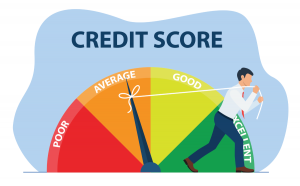What Is a Credit-builder Loan and How Does It Work?

VantageScore vs. FICO Score: What’s the Difference?
04/07/2024
How to Avoid a Growing Credit Card Balance
04/22/2024
If you are unsatisfied with your credit score, then a credit-builder loan may pop up on your radar as a potentially useful tool.
But before you jump into a credit-builder loan, it is critical that you understand exactly what it is and how this type of loan could impact your credit. The reality is that a credit-builder loan used incorrectly could end up hurting your score instead of helping it. Don’t let your credit-building efforts go to waste!
Let’s explore credit-builder loans so that you can decide if this tool is the right fit for your finances.
What Is a Credit-Builder Loan?
A credit-builder loan is a unique loan product designed for those with poor credit or no credit. The purpose of a credit-builder loan is to help someone in that situation build credit from scratch or rebuild their credit history.
A credit-builder loan works very differently from a traditional loan product. Unlike a regular loan, you won’t immediately receive a lump sum when you take out a credit-builder loan.
Instead, you’ll start making monthly payments to the lender right away. With each payment, the lender will tuck away the principal of your loan payment into an earmarked savings account or Certificate of Deposit (CD). And the lender will hang on to the interest payment.
You’ll receive the loan principal amount from the earmarked account at the end of the loan. Of course, you’ll only receive the funds if you complete the loan payments to term. Otherwise, the lender may hang on to the principal funds you’ve built in a savings account as a penalty.
How Does a Credit-Builder Loan Work?
Throughout the course of the loan, the lender will report your payment history to credit bureaus. Depending on the loan provider, they may report your payment history to just one credit bureau or all three major credit bureaus.
If you make regular on-time payments, then the positive payment history should help your credit score. But if you make late payments or no payments at all, a credit-builder loan could end up hurting your credit score.
Do You Lose Money With a Credit-Builder Loan?
As with any loan product, a credit-builder loan comes with some costs to consider.
The first cost to consider is any fees that the lender may attach to the loan. For example, you might have to pay an application fee, origination fee, or administrative fee. Each of these costs will come out of your pocket.
Beyond any outright fees, you’ll find an interest rate attached to the loan. The lender will pocket the interest charges as you make your loan payments. Depending on the loan provider, these interest charges can add up quickly.
Some credit-builder loan providers claim to help the user save money. And that is true to a point; the principal payments will be tucked away for you to receive at some point in the future. However, these funds won’t be available until the end of the term. And nothing is stopping you from tucking away these funds yourself.
If you struggle to build savings, locking these funds away could be helpful. But keep in mind that although you will receive your principal back at the end of the loan term, the same cannot be said for your interest charges.
With that, you will have to pay for the privilege of using a credit-builder loan. Expect to lose some money in exchange for the loan provider’s help reporting your payment history to the promised credit bureaus.
Can a Credit-Builder Loan Help You?
Credit-builder loans can be helpful in some situations. If you have no credit history or bad credit, then credit-builder loans may be able to help.
For example, if you are credit invisible, or in other words, you lack a credit score, a credit-builder loan could be the start of your credit report. If you find yourself in this situation, you aren’t alone! A recent report from the Consumer Financial Protection Bureau found that 26 million Americans are “credit invisible.” With that, many consumers can find credit-builder loans useful.
A credit-builder loan could be just the tool you’ve been looking for when used correctly. But make sure you can commit to the loan payment terms before signing up. Otherwise, you could end up hurting your credit score if you are unable to keep up with the payments.
Is a Credit-builder Loan a Good Idea?
A credit-builder loan is not the right choice for everyone. But if you have the resources to commit to regular loan payments, then a credit-builder loan could be a good idea.
Before signing up, take some time to understand the fee structure and what funds you’ll be parting with forever. Although a credit-builder loan is certainly not free, the improvement to your credit score could help you save big on interest costs for future loans.
For example, let’s say that you are planning to buy a home in the near future. You use a credit-builder loan to help you boost your score. The increased score enables you to lock in an interest rate of 3.5% instead of 4.5%. On a $150,000 mortgage with a 30-year term, that lower interest rate would result in $32,915.87 in savings over the course of the loan.
It can be easy to see why many borrowers decide to give credit-builder loans a try with that example in mind. If you are able to increase your credit score, the potential future savings could significantly outweigh the costs associated with the loan.
How to Get the Most out of a Credit-Builder Loan
If you decide that a credit-builder loan is the right fit for your finances, then you’ll want to make the most of this opportunity to boost your credit score.
Getting the most out of a credit-builder loan starts before signing on the dotted line. Instead of jumping in headfirst, take the time to run the numbers. You’ll want to ensure that you have the funds needed to cover the loan payments. If you do, then you can move forward more confidently. If you don’t have the funds, hold off until your budget can support this extra expense.
Once you’ve taken out a credit-builder loan, keeping up with the payments is critical. You’ll want to make on-time payments each and every month. With that positive payment history, your credit score may improve.
At the end of the term, you’ll receive a relatively large lump sum of savings. To maximize the benefits of a credit-builder loan, use those savings to fund another financial goal. For example, you might use those funds to help pay off debt or build your emergency savings. Take advantage of this opportunity to put those savings to good use.
Should You Pay off a Credit-Builder Loan Early?
If you take out a credit-builder loan, the goal is to build up a history of on-time payments. With that, paying off your credit-builder loan early expectedly will limit the benefits you can receive from a credit-builder loan.
Instead of paying off this loan early, continue to make on-time payments for the duration of the term. By keeping up with the loan until the end of the term, you’ll receive the longest possible payment history for your loan.
Additionally, paying off your loan early could lead to a prepayment penalty that could eat into your savings.
How Much Will A Credit-Builder Loan Raise My Credit Score?
Although a credit-builder loan can raise your credit score, there are no guarantees. You’ll need to manage your credit-builder loan responsibly if you want to raise your credit score. In other words, you’ll need to make on-time payments consistently.
If you are making on-time payments, your credit score will likely rise. That’s because your payment history represents 35% of your credit score. With that, building a positive history of on-time payments should lead to an increase.
For example, some Credit Strong users reported seeing an increase of 30 to 90 points. But Credit Strong doesn’t guarantee these results. Although you can expect to see an increase of some kind, the results will vary based on the other factors on your credit report.
If you have competing information hitting your credit reports, such as a delinquent loan or missed payments, then you may end up seeing your credit score fall despite the credit-builder loan.
Where to Find the Best Credit-Builder Loans
As with all loan products, not all credit-builder loans are created equally.
You’ll want to find a credit-builder loan that strikes a balance between reasonable costs and customer reviews. And, of course, you’ll need to find a credit-builder loan that fits your budget.
Here’s where to start your search for a credit-builder loan that fits your needs.
Online Lenders
Online lenders that offer credit-builder loans include Credit Strong, Self, and MoneyLion.
If working with an online lender, take the time to confirm the company’s legitimacy. You don’t want to send your hard-earned money to a scammer accidentally. The good news is that there are plenty of reputable online lenders that provide credit-builder loans. You just have to find one that is right for you.
Local Banks
Local banks may offer credit-builder loans to their community. As a local bank, the leadership will have a good idea of what issues potential credit-builders are facing in the area. With that fine-tuned knowledge, local banks may have just the right credit-builder loan for your situation.
You can scope out the offerings of your local bank online. Or give their number a call to find out what they can do for your situation.
Credit Unions
Although credit unions often have membership requirements, it is typically fairly easy to become a credit union member. You’ll likely need to make a small deposit. Plus, you may have to live in a certain area, work for a particular company, or worship at a particular church.
Credit unions are known to offer some of the most competitive rates on the market for most loan products. With that, it is worth taking a look at what a credit union may be able to offer you. Joining can be worth the commitment if the credit union offers a credit-builder loan that suits your needs.
Other Credit-building Options
A credit-builder loan is not the only way to manage your credit. In fact, it is one of many valuable options. Let’s explore the other options you should explore when working to develop your credit.
Credit Repair
If you have bad credit, then credit repair is an option worth pursuing.
Essentially, credit repair is the process of removing false information from your credit report that could be dragging your score down. For example, let’s say that you have incorrect information that indicates an account in collections. You can dispute this information. If successful, removing negative marks on your credit report should lead to an increased credit score.
Often, credit repair involves engaging the help of a professional service to remove false information from your credit report. You’ll likely have to pay a monthly fee that ranges from $60 to $100.
As an alternative, you can work on repairing your credit yourself. It is completely free to file a dispute on your own.
Keep in mind that credit repair is not adding any new information to your credit report. With that, there are limitations to how much your score may improve.
Becoming an Authorized User
If you know someone who has a credit card in good standing, you could gain credit history by being added as an authorized user of their account. Once you become a credit card authorized user, as long as the issuer reports authorized users to the credit bureaus, the account should appear on your credit reports.
This method doesn’t guarantee positive results, as it depends on the details of the account and what other information is already in your credit file. However, it’s worth considering if the account has a perfect payment history and at least two years of age.
In the Credit Countdown video below, credit expert John Ulzheimer discusses credit-builder loans and the authorized user strategy, two of the best ways to start building credit.
Want to see more educational credit videos? Head over to our YouTube channel!

Secured Credit Card
A secured credit card is another option for those with poor credit or no credit.
When you open a secured credit card, you’ll have to make a deposit. That deposit will translate into your line of credit. Once opened, you can start managing the secured card responsibly with on-time payments. Over time, the positive payment history and responsible usage can translate into an improved credit score.
As with each option on this list, the benefits of a secured credit card are not guaranteed. Instead, only responsible usage of your credit card will result in a positive impact on your credit report. If you can’t make on-time payments, you will see a negative effect on your credit score.
The Bottom Line
A credit-builder loan is one way to potentially increase your credit score. By building a record of on-time payments, your credit score could improve. However, the results are not guaranteed.
A credit-builder loan isn’t your only option if you are working to build credit. Instead of limiting yourself to a credit-builder loan, you may want to tackle multiple credit-building strategies at once. Consider implementing credit repair and becoming an authorized user while making payments to a credit-builder loan. The combination of strategies could lead to a more successful outcome.





1 Comment
Outstanding advice ‼️